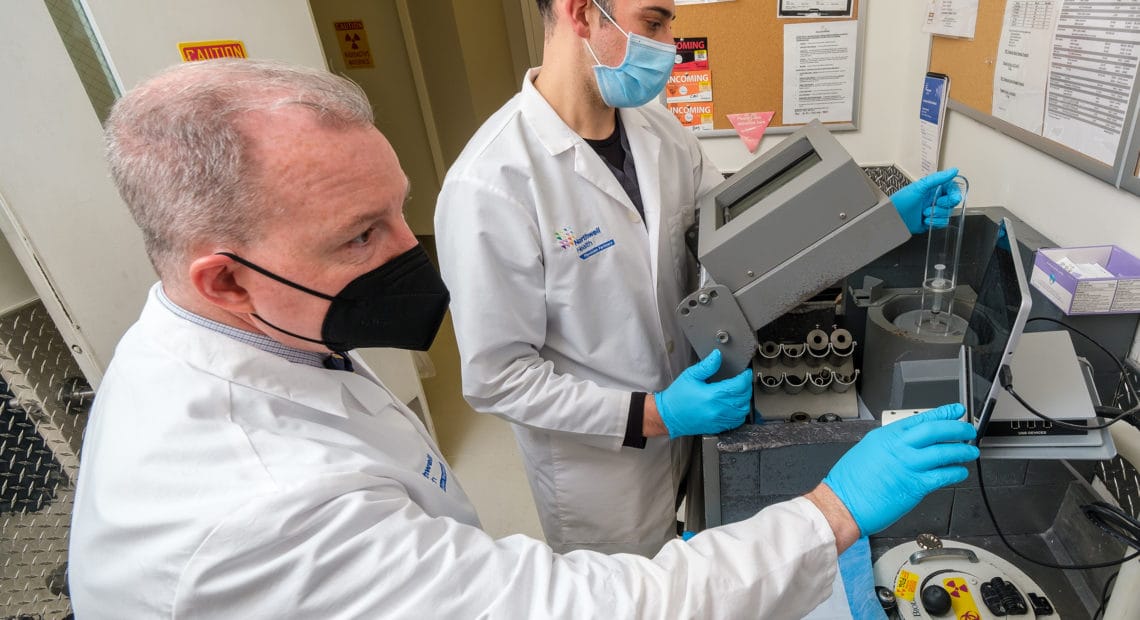Northwell Health Cancer Institute’s radiation and nuclear medicine clinicians are offering a new radiopharmaceutical therapy to treat men with metastatic prostate cancer, which is cancer that has spread beyond the prostate gland. The FDA-approved therapy offers hope for prolonged survival and reduced complications from cancer for those who have limited treatment options.
Known as prostate specific membrane antigen (PSMA) therapy, it targets cancer cells throughout the body and destroys them. Developed by Novartis, the new drug, Pluvicto, also known as lutetium-177 or Lu-PSMA, is a type of radiopharmaceutical therapy. The drug zeroes in on the protein, PSMA, which is found in higher amounts in most prostate cancer cells. Acting like a magnet, the drug locks on to the PSMA protein in the cancer cell membrane, delivering radiation that damages DNA, destroying cancer cells. It is administered via injection into a vein in the arm. Patients could expect to receive one injection every 6 weeks, up to six injections.
The prostate gland is about the size of a walnut and is located in front of the rectum and under the bladder. Prostate cancer is the second leading cause of cancer death in men in the United States. It is estimated that 34,500 deaths from this disease will occur in the U.S. this year, according to the American Cancer Society.
“PSMA as a therapeutic represents a game changer for men with metastatic prostate cancer. We are proud to offer this new, cutting-edge treatment to Northwell patients as well as to men in the region needing this specialized care,” said Louis Potters, MD, deputy physician-in-chief at the Northwell Health Cancer Institute and chair of radiation medicine at Northwell Health. “For patients that fit the criteria for this treatment, it is a big opportunity for them because we are able to offer personalized prostate cancer care when chemotherapy and hormone therapy are not working.”
PSMA therapy is offered at the Cancer Institute’s Radiation Medicine Department at the Center for Advanced Medicine (CFAM), but there are plans to expand the program to other sites, in addition to related therapeutic clinical trials in development.
The PSMA therapy is usually administered in an outpatient setting and takes only a few minutes for the drug to infuse into the bloodstream. The excess drug is excreted through the bladder. Prior to treatment patients receive blood tests and positron emission tomography and computed tomography (PET/CT) diagnostic scan and will have follow up laboratory testing and possibly imaging scans to assess the treatments.
“PSMA has shown to improve survival rates, decrease tumors and lessen the disease’s complications” said Michael Folkert, MD, PhD, a radiation oncologist and vice chair for brachytherapy in radiation medicine at the Northwell Health Cancer Institute, who specializes in procedure-based radiation oncology. He cited the results of a recent groundbreaking clinical trial known as VISION, which studied men with metastatic prostate cancer treated with the radiotherapeutic compared to other standard of care treatment. “Northwell is truly bending the curve to offer personalized cancer treatment approaches to our patients with prostate cancer,” he said.
One of the largest cancer institutes in the New York metropolitan area, Northwell Health Cancer Institute takes a comprehensive approach to treating prostate cancer with a multidisciplinary team of specialists who have unparalleled experience diagnosing and treating the disease. Specialized therapies for cancer include: Minimally invasive robotic surgery, the latest radiation therapy techniques for prostate cancer, focal therapy with laser ablation and transperineal cryotherapy, cutting-edge clinical trials, team approach to tumor boards, clinics, personalized treatments for patients, and physician-scientists that are part of the clinical team.
For more information, please call the Radiation Medicine Center at Northwell Health’s Cancer Institute at: 855-927-6622.








Recent Comments